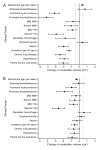Preterm cerebellar growth impairment after postnatal exposure to glucocorticoids
- PMID: 22013125
- PMCID: PMC3682111
- DOI: 10.1126/scitranslmed.3002884
Preterm cerebellar growth impairment after postnatal exposure to glucocorticoids
Abstract
As survival rates of preterm newborns improve as a result of better medical management, these children increasingly show impaired cognition. These adverse cognitive outcomes are associated with decreases in the volume of the cerebellum. Because animals exhibit reduced preterm cerebellar growth after perinatal exposure to glucocorticoids, we sought to determine whether glucocorticoid exposure and other modifiable factors increased the risk for these adverse outcomes in human neonates. We studied 172 preterm neonatal infants from two medical centers, the University of British Columbia and the University of California, San Francisco, by performing serial magnetic resonance imaging examinations near birth and again near term-equivalent age. After we adjusted for associated clinical factors, antenatal betamethasone was not associated with changes in cerebellar volume. Postnatal exposure to clinically routine doses of hydrocortisone or dexamethasone was associated with impaired cerebellar, but not cerebral, growth. Alterations in treatment after preterm birth, particularly glucocorticoid exposure, may help to decrease risk for adverse neurological outcome after preterm birth.
Conflict of interest statement
Figures


Comment in
-
Hedgehog rushes to the rescue of the developing cerebellum.Sci Transl Med. 2011 Oct 19;3(105):105ps40. doi: 10.1126/scitranslmed.3003080. Sci Transl Med. 2011. PMID: 22013122
References
-
- Doyle LW, Anderson PJ. Adult outcome of extremely preterm infants. Pediatrics. 2010;126:342–351. - PubMed
-
- Synnes AR, et al. School Entry Age Outcomes for Infants with Birth Weight </=800 Grams. J Pediatr. 2010;157:989–994. - PubMed
-
- Allin M, et al. Cognitive and motor function and the size of the cerebellum in adolescents born very pre-term. Brain. 2001;124:60–66. - PubMed
-
- Spittle AJ, et al. Reduced cerebellar diameter in very preterm infants with abnormal general movements. Early Hum Dev. 2010;86:1–5. - PubMed
-
- Limperopoulos C, et al. Impaired trophic interactions between the cerebellum and the cerebrum among preterm infants. Pediatrics. 2005;116:844–850. - PubMed
Publication types
MeSH terms
Substances
Grants and funding
LinkOut - more resources
Full Text Sources
Medical
Research Materials

